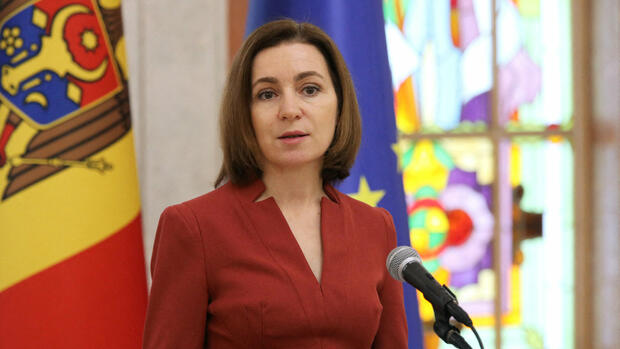Chisinau The first international guests have already arrived in Moldova’s capital Chisinau. The excitement on the ground is great: never before has the small state with 2.6 million inhabitants held a political summit of this magnitude.
Dozens of European leaders are visiting the country as part of a European Political Community (EPC) meeting, including German Chancellor Olaf Scholz and French President Emmanuel Macron. The top-class guest list promises the attention that is urgently needed in Chișinău, because Moldova borders directly on Ukraine, is heavily dependent on international support and is under pressure from Moscow.
The forum is intended to strengthen informal political exchange on the European continent – deliberately far beyond the borders of the EU. Turkish President Recep Tayyip Erdogan and representatives from Serbia, Kosovo, Armenia and Azerbaijan are therefore also expected – a meeting of the extended European family. Representatives from Russia and Belarus are not invited.
For the host country Moldova, the support of the community is essential for its own security. “Hands off Moldova, Ukraine, Georgia and the Western Balkans” is the message to Russia, writes Laurentiu Plesca of the German Marshall Fund think tank.
Economics Minister Alaiba: “Moldova is the biggest collateral casualty of the war”
Moscow has been trying to destabilize Moldova, especially since the war of aggression against Ukraine began. The region of Transnistria, which borders Ukraine, is de facto under Russian control. For years, Moscow has deliberately used the supply of energy to the country as a means of political pressure. In the spring, President Maia Sandu urgently warned against attempted coups.
Pro-Russian parties have repeatedly called for protests against the government.
(Photo: IMAGO/SNA)
Florent Marciacq from the French Institute of International Relations in Paris and Dionis Cenusa from the Lithuanian think tank Eastern Europe Studies Center write that the summit is Moldova’s opportunity to reaffirm its role as a serious partner and highlight its contribution to European debates.
Moldova’s President Maia Sandu wants her country to join the EU by 2030, despite the presence of Russian troops. According to the President, the secret to solving the conflict over Transnistria lies in pushing ahead with economic reforms.
Dumitru Alaiba, the country’s economics minister and deputy prime minister, admits: “It’s not easy to persuade investors to come to Moldova at the moment.” . He has hope in particular for the IT sector and wine production, the country is known for its wine cellars, among other things.
It is not easy to persuade investors to come to Moldova these days. Moldova’s Economy Minister Dumitru Alaiba
At the same time, Alaiba sees his own influence as limited: “The truth is that the situation on the entire continent depends on the situation in the war zone in Ukraine.” And that of his country in particular: “Moldova is the biggest collateral casualty of the war.”
>> Read here: The fear of the coup – Moldova in Moscow’s grip
For example, Moldova’s power grid is connected to that of Ukraine. “Last year the electricity went out for four hours,” reports Alaiba. The reason for the outage in November was attacks on Ukraine’s energy infrastructure. The costs according to Alaiba: 0.07 percent of the country’s gross domestic product, the actual value could be significantly higher.
The power went out again in parts of the country on Tuesday. Some observers suspect that such incidents are controlled from Russia, also on the occasion of the upcoming summit meeting.
Russia apparently continues to try to destabilize the country. The EU on Tuesday imposed sanctions on seven politicians and businessmen with Moldovan or Russian nationality who, among other things, are said to have organized violent demonstrations.
Ukraine’s small neighbor is in urgent need of international support.
(Photo: IMAGO/SNA)
The coming year will show whether the pro-Russian or the EU-oriented side will prevail. Then there is the presidential election. 2025 are general elections. Last winter, dissatisfaction with the high inflation, at times up to 28 percent, was so high that many people joined protests by the pro-Russian Shor party. The party had admitted in the past that participants received money for this. Recently there have also been demonstrations in support of the pro-European government.
Economics Minister Alaiba does not want to be unsettled by this. Inflation is a “rather short-term” problem, he said. He wants to focus on tackling structural and long-term issues.
More: EU Parliament wants rapid accession negotiations with the Republic of Moldova.
